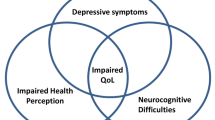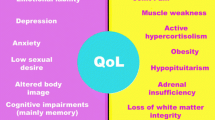Abstract
Introduction
Hypercortisolism leads to severe clinical consequences persisting after the onset of remission. These physical sequelae of cortisol exposure are known to profoundly impact the patient’s quality of life. As psychological factors may be correlated with this quality of life, our objective was to determine the specific weight of psychological determinants of quality of life in patients in remission from hypercortisolism.
Patients and methods
In an observational study, 63 patients with hypercortisolism in remission were asked to complete exhaustive self-administered questionnaires including quality of life (WHOQoL-BREF and Cushing QoL), depression, anxiety, self-esteem, body image, and coping scales. Multivariate analyses were performed. Psychological variables relevant to the model were: anxiety, depression, self-esteem, body image, and positive thinking dimension of the Brief-COPE. Cortisol deficiency was defined as a potential confounder.
Results
The median time since remission was 3 years. Patients had significantly lower quality of life and body satisfaction score than the French population and patients with chronic diseases. Depression significantly impaired all WHOQoL and Cushing QoL domains. A low body satisfaction score significantly impaired social relationships quality of life score. In total, 42.9% of patients still needed working arrangements, 19% had disability or cessation of work.
Conclusion
Patients in biological remission of hypercortisolism can rarely be considered as functionally cured: this is evidenced by altered quality of life, working arrangements, and chronic depression. A multidisciplinary management of these patients is thus mandatory on a long-term basis.

Similar content being viewed by others
References
S.T. Sharma, L.K. Nieman, R.A. Feelders, Comorbidities in Cushing’s disease. Pituitary 18(2), 188–194 (2015)
J.K. Lambert, L. Goldberg, S. Fayngold, J. Kostadinov, K.D. Post, E.B. Geer, Predictors of mortality and long-term outcomes in treated Cushing’s disease: a study of 346 patients. J. Clin. Endocrinol. Metab. 98(3), 1022–1030 (2013)
T. Brue, F. Castinetti, The risks of overlooking the diagnosis of secreting pituitary adenomas. Orphanet. J. Rare. Dis. 11(1), 135 (2016)
L.D. Dorn, E.S. Burgess, T.C. Friedman, B. Dubbert, P.W. Gold, G.P. Chrousos, The longitudinal course of psychopathology in Cushing’s syndrome after correction of hypercortisolism. J. Clin. Endocrinol. Metab. 82(3), 912–919 (1997)
O.M. Dekkers, E. Horvath-Puho, J.O. Jorgensen, S.C. Cannegieter, V. Ehrenstein, J.P. Vandenbroucke et al.Multisystem morbidity and mortality in Cushing’s syndrome: a cohort study. J. Clin. Endocrinol. Metab. 98(6), 2277–2284 (2013)
M. Terzolo, B. Allasino, A. Pia, G. Peraga, F. Daffara, F. Laino et al.Surgical remission of Cushing’s syndrome reduces cardiovascular risk. Eur. J. Endocrinol. 171(1), 127–136 (2014)
R. Pivonello, A. Faggiano, G. Lombardi, A. Colao, The metabolic syndrome and cardiovascular risk in Cushing’s syndrome. Endocrinol. Metab. Clin. North. Am. 34(2), 327–339 (2005). viii
A. Colao, R. Pivonello, S. Spiezia, A. Faggiano, D. Ferone, M. Filippella et al.Persistence of increased cardiovascular risk in patients with Cushing’s disease after five years of successful cure. J. Clin. Endocrinol. Metab. 84(8), 2664–2672 (1999)
A.M. Pereira, J. Tiemensma, J.A. Romijn, Neuropsychiatric disorders in Cushing’s syndrome. Neuroendocrinology 92(Suppl 1), 65–70 (2010)
M.A. Wagenmakers, R.T. Netea-Maier, J.B. Prins, T. Dekkers, M. den Heijer, A.R. Hermus, Impaired quality of life in patients in long-term remission of Cushing’s syndrome of both adrenal and pituitary origin: a remaining effect of long-standing hypercortisolism? Eur. J. Endocrinol. 167(5), 687–695 (2012)
J. Tiemensma, A.A. Kaptein, A.M. Pereira, J.W. Smit, J.A. Romijn, N.R. Biermasz, Negative illness perceptions are associated with impaired quality of life in patients after long-term remission of Cushing’s syndrome. Eur. J. Endocrinol. 165(4), 527–535 (2011)
Development of the World Health Organization WHOQOL-BREF quality of life assessment, The WHOQOL Group. Psychol. Med. 28(3), 551–558 (1998)
C. Baumann, M.L. Erpelding, S. Regat, J.F. Collin, S. Briancon, The WHOQOL-BREF questionnaire: French adult population norms for the physical health, psychological health and social relationship dimensions. Rev. Epidemiol. Sante Publique 58(1), 33–39 (2010)
S.M. Webb, X. Badia, M.J. Barahona, A. Colao, C.J. Strasburger, A. Tabarin et al.Evaluation of health-related quality of life in patients with Cushing’s syndrome with a new questionnaire. Eur. J. Endocrinol. 158(5), 623–630 (2008)
A.S. Zigmond, R.P. Snaith, The hospital anxiety and depression scale. Acta Psychiatr. Scand. 67(6), 361–370 (1983)
J.P. Lepine, M. Godchau, P. Brun, T. Lemperiere, [Evaluation of anxiety and depression among patients hospitalized on an internal medicine service]. Ann. Med. Psychol. (Paris) 143(2), 175–189 (1985)
Rosenberg M. Society and the Adolescent Self-Image. Princeton: Princeton University Press. 1965.
E. Vallieres, R. Vallerand, Traduction et Validation Canadienne-Française de L’échelle de L’estime de Soi de Rosenberg. Int. J. Psychol. 25(2), 305–316 (1990)
M. Koleck, M. Bruchon-Schweitzer, F. Cousson-Gelie, J. Gilliard, B. Quintard, The body-image questionnaire: an extension. Percept. Mot. Skills 94(1), 189–196 (2002)
Lazarus R., Folkman S. Stress, appraisal, and coping: New York: Springer; 1984.
L. Muller, E. Spitz, [Multidimensional assessment of coping: validation of the Brief COPE among French population]. Encephale 29(6), 507–518 (2003)
K. Baumstarck, M. Alessandrini, Z. Hamidou, P. Auquier, T. Leroy, L. Boyer, Assessment of coping: a new french four-factor structure of the brief COPE inventory. Health Qual. Life Outcomes 15(1), 8 (2017)
P. Pires, A. Santos, Y. Vives-Gilabert, S.M. Webb, A. Sainz-Ruiz, E. Resmini et al. White matter involvement on DTI-MRI in Cushing’s syndrome relates to mood disturbances and processing speed: a case-control study. Pituitary 20(3), 340–348 (2017)
M. Tohen, J. Hennen, C.M. Zarate Jr., R.J. Baldessarini, S.M. Strakowski, A.L. Stoll et al. Two-year syndromal and functional recovery in 219 cases of first-episode major affective disorder with psychotic features. Am. J. Psychiatry 157(2), 220–228 (2000)
A. Santos, E. Resmini, J.C. Pascual, I. Crespo, S.M. Webb, Psychiatric symptoms in patients with Cushing’s syndrome: prevalence, diagnosis and management. Drugs 77(8), 829–842 (2017)
L.M. Nelson, A. Forsythe, L. McLeod, S. Pulgar, M. Maldonado, T. Coles et al. Psychometric evaluation of the Cushing’s Quality-of-Life questionnaire. Patient 6(2), 113–124 (2013)
K.A. Phillips, S.A. Rasmussen, Change in psychosocial functioning and quality of life of patients with body dysmorphic disorder treated with fluoxetine: a placebo-controlled study. Psychosomatics 45(5), 438–444 (2004)
S. Choi-Kwon, J. Choi, S.U. Kwon, D.W. Kang, J.S. Kim, Fluoxetine improves the quality of life in patients with poststroke emotional disturbances. Cerebrovasc. Dis. 26(3), 266–271 (2008)
T. Toffanin, F. Nifosi, H. Follador, A. Passamani, F. Zonta, G. Ferri et al. Volumetric MRI analysis of hippocampal subregions in Cushing’s disease: a model for glucocorticoid neural modulation. Eur. Psychiatry 26(1), 64–67 (2011)
E. Resmini, A. Santos, B. Gomez-Anson, O. Lopez-Mourelo, P. Pires, Y. Vives-Gilabert et al. Hippocampal dysfunction in cured Cushing’s syndrome patients, detected by (1) H-MR-spectroscopy. Clin. Endocrinol. (Oxf.). 79(5), 700–707 (2013)
J.M. Launay, S. Mouillet-Richard, A. Baudry, M. Pietri, O. Kellermann, Raphe-mediated signals control the hippocampal response to SRI antidepressants via miR-16. Transl. Psychiatry 1, e56 (2011)
J. Tiemensma, N.P. Daskalakis, E.M. van der Veen, S. Ramondt, S.K. Richardson, E. Broadbent et al. Drawings reflect a new dimension of the psychological impact of long-term remission of Cushing’s syndrome. J. Clin. Endocrinol. Metab. 97(9), 3123–3131 (2012)
S.B. Abraham, B.S. Abel, D. Rubino, T. Nansel, S. Ramsey, L.K. Nieman, A direct comparison of quality of life in obese and Cushing’s syndrome patients. Eur. J. Endocrinol. 168(5), 787–793 (2013)
E.B. Geer, Y. Lalazar, L.M. Couto, V. Cohen, L.R. Lipton, W. Shi et al. A prospective study of appetite and food craving in 30 patients with Cushing’s disease. Pituitary 19(2), 117–126 (2016)
C. De Bucy, L. Guignat, T. Niati, J. Bertherat, J. Coste, Health-related quality of life of patients with hypothalamic-pituitary-adrenal axis dysregulations: a cohort study. Eur. J. Endocrinol. 177(1), 1–8 (2017)
S. Bensing, A.L. Hulting, E.S. Husebye, O. Kampe, K. Lovas, MANAGEMENT OF ENDOCRINE DISEASE: Epidemiology, quality of life and complications of primary adrenal insufficiency: a review. Eur. J. Endocrinol. 175(3), R107–R116 (2016)
J. Tiemensma, C.D. Andela, A.A. Kaptein, J.A. Romijn, R.C. van der Mast, N.R. Biermasz et al. Psychological morbidity and impaired quality of life in patients with stable treatment for primary adrenal insufficiency: cross-sectional study and review of the literature. Eur. J. Endocrinol. 171(2), 171–182 (2014)
S.R. Kesler, H.F. Adams, C.M. Blasey, E.D. Bigler, Premorbid intellectual functioning, education, and brain size in traumatic brain injury: an investigation of the cognitive reserve hypothesis. Appl. Neuropsychol. 10(3), 153–162 (2003)
Y. Stern, Cognitive reserve in ageing and Alzheimer’s disease. Lancet Neurol. 11(11), 1006–1012 (2012)
Y. Stern, The concept of cognitive reserve: a catalyst for research. J. Clin. Exp. Neuropsychol. 25(5), 589–593 (2003)
Acknowledgements
We thank the patients and the members of the “Association Surrenales”, especially C. Colin and S. Templereau.
Author information
Authors and Affiliations
Corresponding author
Ethics declarations
Conflict of interest
MV, MA, TG, CP, KB, FS, HD, TB, and FC declare that they have no conflict of interest.
Ethical approval
All procedures performed in studies involving human participants were in accordance with the ethical standards of the institutional and/or national research committee and with the 1964 Helsinki declaration and its later amendments or comparable ethical standards.
Informed consent
It was obtained from all individual participants included in the study.
Electronic supplementary material
Rights and permissions
About this article
Cite this article
Vermalle, M., Alessandrini, M., Graillon, T. et al. Lack of functional remission in Cushing’s syndrome. Endocrine 61, 518–525 (2018). https://doi.org/10.1007/s12020-018-1664-7
Received:
Accepted:
Published:
Issue Date:
DOI: https://doi.org/10.1007/s12020-018-1664-7




